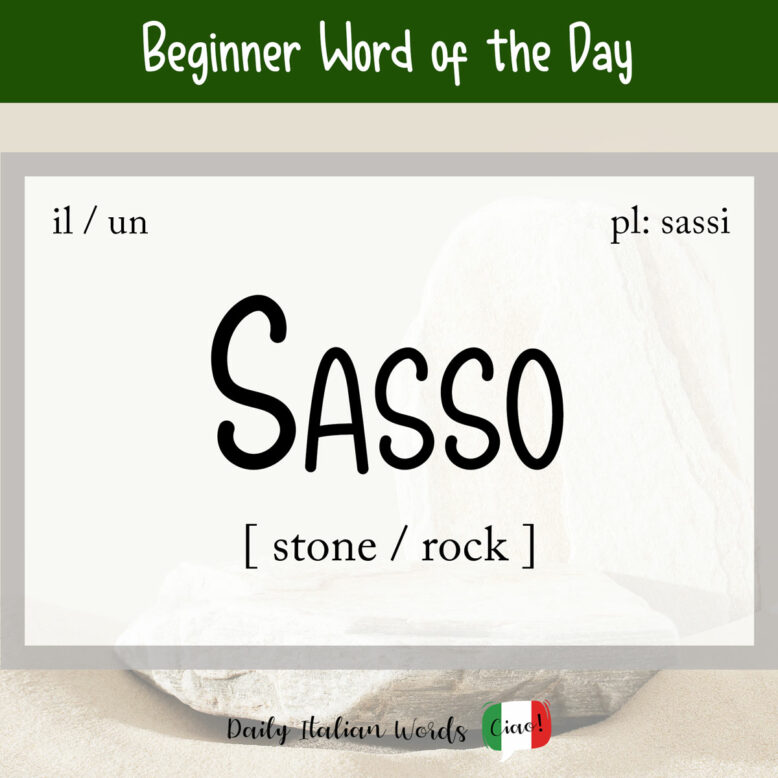The Italian term sasso is fairly comprehensive in that it can be used to denote anything rock-like, from the smallest pebbles and stones to rocks, boulders, and even larger masses. In fact, it can even refer to rock faces and mountains, especially in toponyms such as Gran Sasso d’Italia, a massif in the Apennine Mountains of Italy!

Sasso is a masculine term, so it takes the following definite and indefinite articles:
il sasso
the stone
un sasso
a stone
i sassi
the stones
dei sassi
(some) stones
Ci sono così tanti sassi sul lungomare che non riesco a spingere il passeggino.
There are so many stones along the promenade that I can’t push the stroller.
C’è un grande sasso che blocca la strada. Come facciamo?
There’s a big boulder blocking the road. What should we do?

What’s truly interesting about the word sasso, however, is just how many figurative uses it has. For starters, it often appears in comparative statements as a symbol of toughness, stubbornness, impassivity or cruelty. Some of the most well-known expressions include:
- essere duro come un sasso = to be as hard as rock, to be insensitive
- avere il cuore di sasso = to have a heart of stone
- non essere di sasso = (lit. to not be made of stone) – to be flesh and blood, and therefore vulnerable to feelings, emotions and temptation
Non riesco a tagliare la pagnotta. È dura come un sasso!
I’m not able to cut the loaf. It’s as hard as rock!
Other expressions equate the act of throwing stones with disturbing the peace or causing trouble.
- tirare / lanciare il sasso e nascondere la mano = (lit. to throw a stone and hide one’s hand) – to provoke or cause harm without exposing yourself
- lanciare un sasso nello stagno = (lit. to throw a stone in the pond) – to provoke controversy on purpose, to upset a peaceful situation
- Posa il sasso! = (lit. Put down the stone!) = Addressed to someone with a threatening countenance to get them to calm down.

Some expressions even go as far as to anthropomorphise sassi as in the following idiomatic phrases:
- far piangere i sassi = (lit. to make even the stones cry) – said of an extremely moving situation or thing
- far voltare anche i sassi = (lit. to make even the stones turn their heads) – said of something that would make anyone turn their head
- Lo sanno anche i sassi! = (lit. Even the stones know that!) – Everyone knows that!
È una bellissima canzone che fa piangere anche i sassi!
It’s a beautiful song that can make even stones cry!
A popular children’s game with which everyone is familiar is forbice, carta, sasso, known as rock, paper, scissors in English.

Then we have the interesting expression sasso in bocca (lit. stone in mouth). It refers to the Mafia’s morbid custom of placing a stone inside the mouth of a murdered spy, as a signal to others that he should not have spoken or shared secrets. If you say to someone Sasso in bocca!, you are telling them to keep their mouth shut. Il Sasso in Bocca is also the title of a film, directed by Giuseppe Ferrara, about how the mafia conquered Sicily, the whole of Italy and parts of the United States.
Finally, Sassi di Matera is the name of two districts (Sasso Caveoso and Sasso Barisano) in the Italian City of Matera, located in the Basilicata region. It’s a well-known location for its unique landscape and ancient caves.
Even more useful idioms featuring ‘sasso’
If you thought we’d worked through all the idioms containing the word sasso, think again! Below you’ll find three more that are used on a regular basis!
Dormire come un sasso
Literal translation: to sleep like a stone
English meaning: to sleep like a log
Rimanere / restare di sasso
Literal translation: to stay like a stone
English meaning:to be dumbfounded
A un tiro di sasso
Literal translation: at a stone’s throw
English meaning: a stone’s throw away
Heather Broster is a graduate with honours in linguistics from the University of Western Ontario. She is an aspiring polyglot, proficient in English and Italian, as well as Japanese, Welsh, and French to varying degrees of fluency. Originally from Toronto, Heather has resided in various countries, notably Italy for a period of six years. Her primary focus lies in the fields of language acquisition, education, and bilingual instruction.


